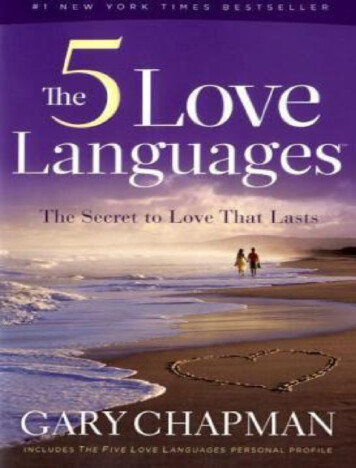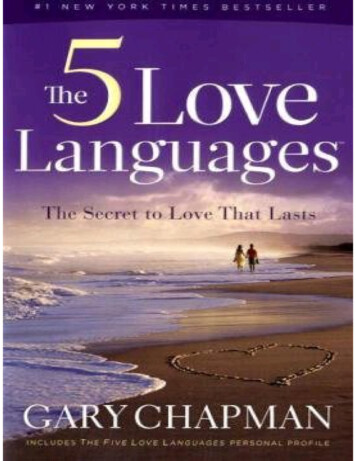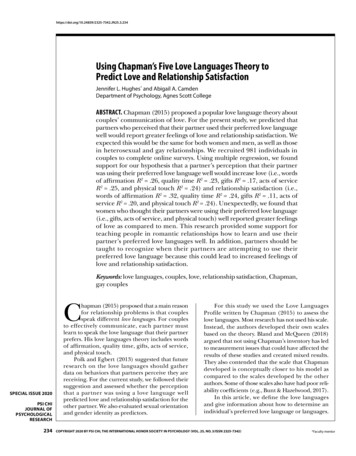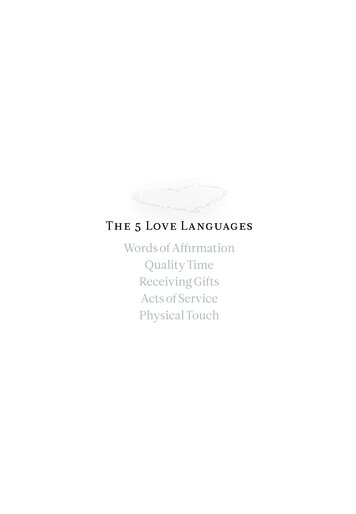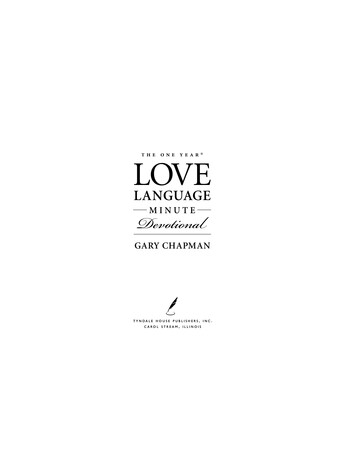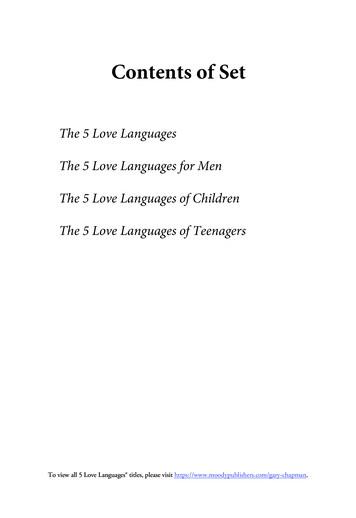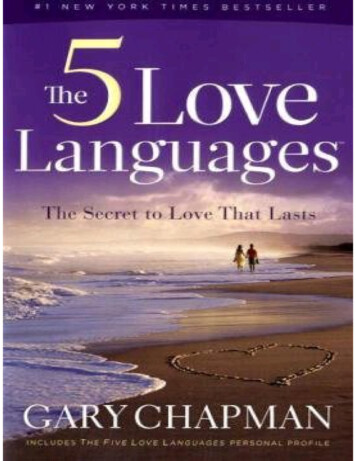
Transcription
THE Five LOVE LANGUAGES
THE Five LOVE LANGUAGESHow to Express Heartfelt Commitment to Your Mate
GARYCHAPMANNORTHFIELD PUBLISHINGCHICAGO
1992, 1995, 2004by Gary D. ChapmanAll rights reserved. No part of this book may be reproduced in any form without permission inwriting from the publisher, except in the case of brief quotations embodied in critical articles orreviews.Scripture quotations, unless noted otherwise, are taken from the Holy Bible: New InternationalVersion . Copyright 1973, 1978, 1984, International Bible Society. Used by permission ofZondervan Publishing House. All rights reserved.The use of selected references from various versions of the Bible in this publication does notnecessarily imply publisher endorsement of the versions in their entirety.ISBN: 978-1-881273-15-6
To Karolyn,Shelley, and Derek
Other Great Books by Gary ChapmanThe Five Love Languages Men’s EditionThe Five Love Languages Gift EditionThe Five Love Languages of ChildrenThe Five Love Languages of TeenagersThe Five Love Languages for SinglesYour Gift of LoveParenting Your Adult ChildThe Other Side of LoveLoving SolutionsFive Signs of a Loving FamilyToward a Growing MarriageHope for the SeparatedCovenant Marriage
CONTENTSAcknowledgments1. What Happens to Love After the Wedding?2. Keeping the Love Tank Full3. Falling in Love4. Love Language #1: Words of Affirmation5. Love Language #2: Quality Time6. Love Language #3: Receiving Gifts7. Love Language #4: Acts of Service8. Love Language #5: Physical Touch9. Discovering Your Primary Love Language10. Love Is a Choice11. Love Makes the Difference12. Loving the Unlovely13. Children and Love Languages14. A Personal WordThe Five Love Languages Profile for HusbandsThe Five Love Languages Profile for Wives
ACKNOWLEDGMENTSLove begins, or should begin, at home. For me that means Sam and Grace, Dad and Mom, whohave loved me for more than fifty years. Without them I would still be seeking love instead of writingabout it. Home also means Karolyn, to whom I have been married for more than forty years. If allwives loved as she does, fewer men would be looking over the fence. Shelley and Derek are now outof the nest, exploring new worlds, but I feel secure in the warmth of their love. I am blessed andgrateful.I am indebted to a host of professionals who have influenced my concepts of love. Among themare psychiatrists Ross Campbell, Judson Swihart, and Scott Peck. For editorial assistance, I amindebted to Debbie Barr and Cathy Peterson. The technical expertise of Tricia Kube and Don Schmidtmade it possible to meet publication deadlines. Last, and most important, I want to express mygratitude to the hundreds of couples who, over the past thirty years, have shared the intimate side oftheir lives with me. This book is a tribute to their honesty.
chapter one
WHAT HAPPENS TO LOVE AFTER THE WEDDING?At 30,000 feet, somewhere between Buffalo and Dallas, he put his magazine in his seat pocket,turned in my direction, and asked, “What kind of work do you do?”“I do marriage counseling and lead marriage enrichment seminars,” I said matter-of-factly.“I’ve been wanting to ask someone this for a long time,” he said. “What happens to the love afteryou get married?”Relinquishing my hopes of getting a nap, I asked, “What do you mean?”“Well,” he said, “I’ve been married three times, and each time, it was wonderful before we gotmarried, but somehow after the wedding it all fell apart. All the love I thought I had for her and thelove she seemed to have for me evaporated. I am a fairly intelligent person. I operate a successfulbusiness, but I don’t understand it.”“How long were you married?” I asked.“The first one lasted about ten years. The second time, we were married three years, and the lastone, almost six years.”“Did your love evaporate immediately after the wedding, or was it a gradual loss?” I inquired.“Well, the second one went wrong from the very beginning. I don’t know what happened. I reallythought we loved each other, but the honeymoon was a disaster, and we never recovered. We onlydated six months. It was a whirlwind romance. It was really exciting! But after the marriage, it was abattle from the beginning.“In my first marriage, we had three or four good years before the baby came. After the baby wasborn, I felt like she gave her attention to the baby and I no longer mattered. It was as if her one goal inlife was to have a baby, and after the baby, she no longer needed me.”“Did you tell her that?” I asked.“Oh, yes, I told her. She said I was crazy. She said I did not understand the stress of being atwenty-four-hour nurse. She said I should be more understanding and help her more. I really tried, butit didn’t seem to make any difference. After that, we just grew further apart. After a while, there wasno love left, just deadness. Both of us agreed that the marriage was over.“My last marriage? I really thought that one would be different. I had been divorced for threeyears. We dated each other for two years. I really thought we knew what we were doing, and I thoughtthat perhaps for the first time I really knew what it meant to love someone. I genuinely felt that sheloved me.“After the wedding, I don’t think I changed. I continued to express love to her as I had beforemarriage. I told her how beautiful she was. I told her how much I loved her. I told her how proud Iwas to be her husband. But a few months after marriage, she started complaining; about petty things atfirst—like my not taking the garbage out or not hanging up my clothes. Later, she went to attacking mycharacter, telling me she didn’t feel she could trust me, accusing me of not being faithful to her. Shebecame a totally negative person. Before marriage, she was never negative. She was one of the mostpositive people I have ever met. That is one of the things that attracted me to her. She nevercomplained about anything. Everything I did was wonderful, but once we were married, it seemed Icould do nothing right. I honestly don’t know what happened. Eventually, I lost my love for her and
began to resent her. She obviously had no love for me. We agreed there was no benefit to our livingtogether any longer, so we split.“That was a year ago. So my question is, What happens to love after the wedding? Is myexperience common? Is that why we have so many divorces in our country? I can’t believe that ithappened to me three times. And those who don’t divorce, do they learn to live with the emptiness, ordoes love really stay alive in some marriages? If so, how?”The questions my friend seated in 5A was asking are the questions that thousands of married anddivorced persons are asking today. Some are asking friends, some are asking counselors and clergy,and some are asking themselves. Sometimes the answers are couched in psychological researchjargon that is almost incomprehensible. Sometimes they are couched in humor and folklore. Most ofthe jokes and pithy sayings contain some truth, but they are like offering an aspirin to a person withcancer.The desire for romantic love in marriage is deeply rooted in our psychological makeup. Almostevery popular magazine has at least one article each issue on keeping love alive in a marriage. Booksabound on the subject. Television and radio talk shows deal with it. Keeping love alive in ourmarriages is serious business.With all the books, magazines, and practical help available, why is it that so few couples seemto have found the secret to keeping love alive after the wedding? Why is it that a couple can attend acommunication workshop, hear wonderful ideas on how to enhance communication, return home, andfind themselves totally unable to implement the communication patterns demonstrated? How is it thatwe read a magazine article on “101 Ways to Express Love to Your Spouse,” select two or three waysthat seem especially good to us, try them, and our spouse doesn’t even acknowledge our effort? Wegive up on the other 98 ways and go back to life as usual.We must be willing to learn our spouse’s primary love language if we are to be effectivecommunicators of love.The answer to those questions is the purpose of this book. It is not that the books and articlesalready published are not helpful. The problem is that we have overlooked one fundamental truth:People speak different love languages.In the area of linguistics, there are major language groups: Japanese, Chinese, Spanish, English,Portuguese, Greek, German, French, and so on. Most of us grow up learning the language of ourparents and siblings, which becomes our primary or native tongue. Later, we may learn additionallanguages but usually with much more effort. These become our secondary languages. We speak andunderstand best our native language. We feel most comfortable speaking that language. The more weuse a secondary language, the more comfortable we become conversing in it. If we speak only ourprimary language and encounter someone else who speaks only his or her primary language, which isdifferent from ours, our communication will be limited. We must rely on pointing, grunting, drawingpictures, or acting out our ideas. We can communicate, but it is awkward. Language differences arepart and parcel of human culture. If we are to communicate effectively across cultural lines, we must
learn the language of those with whom we wish to communicate.In the area of love, it is similar. Your emotional love language and the language of your spousemay be as different as Chinese from English. No matter how hard you try to express love in English, ifyour spouse understands only Chinese, you will never understand how to love each other. My friendon the plane was speaking the language of “Affirming Words” to his third wife when he said, “I toldher how beautiful she was. I told her I loved her. I told her how proud I was to be her husband.” Hewas speaking love, and he was sincere, but she did not understand his language. Perhaps she waslooking for love in his behavior and didn’t see it. Being sincere is not enough. We must be willing tolearn our spouse’s primary love language if we are to be effective communicators of love.My conclusion after thirty years of marriage counseling is that there are basically five emotionallove languages—five ways that people speak and understand emotional love. In the field oflinguistics a language may have numerous dialects or variations. Similarly, within the five basicemotional love languages, there are many dialects. That accounts for the magazine articles titled “10Ways to Let Your Spouse Know You Love Her,” “20 Ways to Keep Your Man at Home,” or “365Expressions of Marital Love.” There are not 10, 20, or 365 basic love languages. In my opinion, thereare only five. However, there may be numerous dialects. The number of ways to express love withina love language is limited only by one’s imagination. The important thing is to speak the lovelanguage of your spouse.We have long known that in early childhood development each child develops unique emotionalpatterns. Some children, for example, develop a pattern of low self-esteem whereas others havehealthy self-esteem. Some develop emotional patterns of insecurity whereas others grow up feelingsecure. Some children grow up feeling loved, wanted, and appreciated, yet others grow up feelingunloved, unwanted, and unappreciated.The children who feel loved by their parents and peers will develop a primary emotional lovelanguage based on their unique psychological makeup and the way their parents and other significantpersons expressed love to them. They will speak and understand one primary love language. Theymay later learn a secondary love language, but they will always feel most comfortable with theirprimary language. Children who do not feel loved by their parents and peers will also develop aprimary love language. However, it will be somewhat distorted in much the same way as somechildren may learn poor grammar and have an underdeveloped vocabulary. That poor programmingdoes not mean they cannot become good communicators. But it does mean they will have to work at itmore diligently than those who had a more positive model. Likewise, children who grow up with anunderdeveloped sense of emotional love can also come to feel loved and to communicate love, butthey will have to work at it more diligently than those who grew up in a healthy, loving atmosphere.Seldom do a husband and wife have the same primary emotional love language. We tend tospeak our primary love language, and we become confused when our spouse does not understandwhat we are communicating. We are expressing our love, but the message does not come throughbecause we are speaking what, to them, is a foreign language. Therein lies the fundamental problem,and it is the purpose of this book to offer a solution. That is why I dare to write another book on love.Once we discover the five basic love languages and understand our own primary love language, aswell as the primary love language of our spouse, we will then have the needed information to applythe ideas in the books and articles.
Once you identify and learn to speak your spouse’s primary love language, I believe that you willhave discovered the key to a long-lasting, loving marriage. Love need not evaporate after thewedding, but in order to keep it alive most of us will have to put forth the effort to learn a secondarylove language. We cannot rely on our native tongue if our spouse does not understand it. If we wanthim/her to feel the love we are trying to communicate, we must express it in his or her primary lovelanguage.
chapter two
KEEPING THE LOVE TANK FULLLove is the most important word in the English language—and the most confusing. Both secular andreligious thinkers agree that love plays a central role in life. We are told that “love is a manysplendored thing” and that “love makes the world go round.” Thousands of books, songs, magazines,and movies are peppered with the word. Numerous philosophical and theological systems have madea prominent place for love. And the founder of the Christian faith wanted love to be the distinguishingcharacteristic of His followers.1Psychologists have concluded that the need to feel loved is a primary human emotional need. Forlove, we will climb mountains, cross seas, traverse desert sands, and endure untold hardships.Without love, mountains become unclimbable, seas uncrossable, deserts unbearable, and hardshipsour plight in life. The Christian apostle to the Gentiles, Paul, exalted love when he indicated that allhuman accomplishments that are not motivated by love are, in the end, empty. He concluded that in thelast scene of the human drama, only three characters will remain: “faith, hope and love. But thegreatest of these is love.”2If we can agree that the word love permeates human society, both historically and in the present,we must also agree that it is a most confusing word. We use it in a thousand ways. We say, “I love hotdogs,” and in the next breath, “I love my mother.” We speak of loving activities: swimming, skiing,hunting. We love objects: food, cars, houses. We love animals: dogs, cats, even pet snails. We lovenature: trees, grass, flowers, and weather. We love people: mother, father, son, daughter, parents,wives, husbands, friends. We even fall in love with love.If all that is not confusing enough, we also use the word love to explain behavior. “I did itbecause I love her.” That explanation is given for all kinds of actions. A man is involved in anadulterous relationship, and he calls it love. The preacher, on the other hand, calls it sin. The wife ofan alcoholic picks up the pieces after her husband’s latest episode. She calls it love, but thepsychologist calls it codependency. The parent indulges all the child’s wishes, calling it love. Thefamily therapist would call it irresponsible parenting. What is loving behavior?The purpose of this book is not to eliminate all confusion surrounding the word love, but to focus onthat kind of love that is essential to our emotional health. Child psychologists affirm that every childhas certain basic emotional needs that must be met if he is to be emotionally stable. Among thoseemotional needs, none is more basic than the need for love and affection, the need to sense that he orshe belongs and is wanted. With an adequate supply of affection, the child will likely develop into aresponsible adult. Without that love, he or she will be emotionally and socially retarded.I liked the metaphor the first time I heard it: “Inside every child is an ‘emotional tank’ waiting tobe filled with love. When a child really feels loved, he will develop normally but when the love tankis empty, the child will misbehave. Much of the misbehavior of children is motivated by the cravingsof an empty ‘love tank.’” I was listening to Dr. Ross Campbell, a psychiatrist who specializes in thetreatment of children and adolescents.
As I listened, I thought of the hundreds of parents who had paraded the misdeeds of theirchildren through my office. I had never visualized an empty love tank inside those children, but I hadcertainly seen the results of it. Their misbehavior was a misguided search for the love they did notfeel. They were seeking love in all the wrong places and in all the wrong ways.I remember Ashley, who at thirteen years of age was being treated for a sexually transmitteddisease. Her parents were crushed. They were angry with Ashley. They were upset with the school,which they blamed for teaching her about sex. “Why would she do this?” they asked.At the heart of mankind’s existence is the desire to be intimate and to be loved by another.Marriage is designed to meet that need for intimacy and love.In my conversation with Ashley, she told me of her parents’ divorce when she was six years old.“I thought my father left because he didn’t love me,” she said. “When my mother remarried when Iwas ten, I felt she now had someone to love her, but I still had no one to love me. I wanted so much tobe loved. I met this boy at school. He was older than me, but he liked me. I couldn’t believe it. Hewas kind to me, and in a while I really felt he loved me. I didn’t want to have sex, but I wanted to beloved.”Ashley’s “love tank” had been empty for many years. Her mother and stepfather had providedfor her physical needs but had not realized the deep emotional struggle raging inside her. Theycertainly loved Ashley, and they thought that she felt their love. Not until it was almost too late didthey discover that they were not speaking Ashley’s primary love language.The emotional need for love, however, is not simply a childhood phenomenon. That need follows usinto adulthood and into marriage. The “in love” experience temporarily meets that need, but it isinevitably a “quick fix” and, as we shall learn later, has a limited and predictable life span. After wecome down from the high of the “in love” obsession, the emotional need for love resurfaces becauseit is fundamental to our nature. It is at the center of our emotional desires. We needed love before we“fell in love,” and we will need it as long as we live.The need to feel loved by one’s spouse is at the heart of marital desires. A man said to merecently, “What good is the house, the cars, the place at the beach, or any of the rest of it if your wifedoesn’t love you?” Do you understand what he was really saying? “More than anything, I want to beloved by my wife.” Material things are no replacement for human, emotional love. A wife says, “Heignores me all day long and then wants to jump in bed with me. I hate it.” She is not a wife who hatessex; she is a wife desperately pleading for emotional love.Something in our nature cries out to be loved by another. Isolation is devastating to the humanpsyche. That is why solitary confinement is considered the cruelest of punishments. At the heart ofmankind’s existence is the desire to be intimate and to be loved by another. Marriage is designed tomeet that need for intimacy and love. That is why the ancient biblical writings spoke of the husbandand wife becoming “one flesh.” That did not mean that individuals would lose their identity; it meantthat they would enter into each other’s lives in a deep and intimate way. The New Testament writerschallenged both the husband and the wife to love each other. From Plato to Peck, writers haveemphasized the importance of love in marriage.
But, if love is important, it is also elusive. I have listened to many married couples share theirsecret pain. Some came to me because the inner ache had become unbearable. Others came becausethey realized that their behavior patterns or the misbehavior of their spouse was destroying themarriage. Some came simply to inform me that they no longer wanted to be married. Their dreams of“living happily ever after” had been dashed against the hard walls of reality. Again and again I haveheard the words “Our love is gone, our relationship is dead. We used to feel close, but not now. Weno longer enjoy being with each other. We don’t meet each other’s needs.” Their stories beartestimony that adults as well as children have “love tanks.”Could it be that deep inside hurting couples exists an invisible “emotional love tank” with itsgauge on empty? Could the misbehavior, withdrawal, harsh words, and critical spirit occur becauseof that empty tank? If we could find a way to fill it, could the marriage be reborn? With a full tankwould couples be able to create an emotional climate where it is possible to discuss differences andresolve conflicts? Could that tank be the key that makes marriage work?Those questions sent me on a long journey. Along the way, I discovered the simple yet powerfulinsights contained in this book. The journey has taken me not only through thirty years of marriagecounseling but into the hearts and minds of hundreds of couples throughout America. From Seattle toMiami, couples have invited me into the inner chamber of their marriages, and we have talked openly.The illustrations included in this book are cut from the fabric of real life. Only names and places arechanged to protect the privacy of the individuals who have spoken so freely.I am convinced that keeping the emotional love tank full is as important to a marriage asmaintaining the proper oil level is to an automobile. Running your marriage on an empty “love tank”may cost you even more than trying to drive your car without oil. What you are about to read has thepotential of saving thousands of marriages and can even enhance the emotional climate of a goodmarriage. Whatever the quality of your marriage now, it can always be better.WARNING: Understanding the five love languages and learning to speak the primary lovelanguage of your spouse may radically affect his or her behavior. People behave differently whentheir emotional love tanks are full.Before we examine the five love languages, however, we must address one other important butconfusing phenomenon: the euphoric experience of “falling in love.”NOTES1. John 13:35.2. 1 Corinthians 13:13.
chapter three
FALLING IN LOVEShe showed up at my office without an appointment and asked my secretary if she could see me forfive minutes. I had known Janice for eighteen years. She was thirty-six and had never married. Shehad dated several men through the years, one for six years, another for three years, and several othersfor shorter periods of time. From time to time, she had made appointments with me to discuss aparticular difficulty in one of her relationships. She was by nature a disciplined, conscientious,organized, thoughtful, and caring person. It was completely out of character for her to show up at myoffice unannounced. I thought, There must be some terrible crisis for Janice to show up without anappointment. I told my secretary to show her in, and I fully expected to see her burst into tears andtell me some tragic story as soon as the door was closed. Instead, she virtually skipped into myoffice, beaming with excitement.“How are you today, Janice?” I asked.“Great!” she said. “I’ve never been better in my life. I’m getting married!”“You are?” I said, revealing my shock. “To whom and when?”“To David Gallespie,” she exclaimed, “in September.”“That’s exciting. How long have you been dating?”“Three weeks. I know it’s crazy, Dr. Chapman, after all the people I have dated and the numberof times I came so close to getting married. I can’t believe it myself, but I know David is the one forme. From the first date, we both knew it. Of course, we didn’t talk about it on the first night, but oneweek later, he asked me to marry him. I knew he was going to ask me, and I knew I was going to sayyes. I have never felt this way before, Dr. Chapman. You know about the relationships that I have hadthrough the years and the struggles I have had. In every relationship, something was not right. I neverfelt at peace about marrying any of them, but I know that David is the right one.”By this time, Janice was rocking back and forth in her chair, giggling and saying, “I know it’scrazy, but I am so happy. I have never been this happy in my life.”What has happened to Janice? She has fallen in love. In her mind, David is the most wonderfulman she has ever met. He is perfect in every way. He will make the ideal husband. She thinks abouthim day and night. The facts that David has been married twice before, has three children, and hashad three jobs in the past year are trivial to Janice. She’s happy, and she is convinced that she isgoing to be happy forever with David. She is in love.Most of us enter marriage by way of the “in love” experience. We meet someone whose physicalcharacteristics and personality traits create enough electrical shock to trigger our “love alert” system.The bells go off, and we set in motion the process of getting to know the person. The first step may besharing a hamburger or steak, depending on our budget, but our real interest is not in the food. We areon a quest to discover love. “Could this warm, tingly feeling I have inside be the ‘real’ thing?”Sometimes we lose the tingles on the first date. We find out that she dips snuff, and the tinglesrun right out our toes; we want no more hamburgers with her. Other times, however, the tingles are
stronger after the hamburger than before. We arrange for a few more “together” experiences, andbefore long the level of intensity has increased to the point where we find ourselves saying, “I thinkI’m falling in love.” Eventually we are convinced that it is the “real thing,” and we tell the otherperson, hoping the feeling is reciprocal. If it isn’t, things cool off a bit or we redouble our efforts toimpress, and eventually win the love of, our beloved. When it is reciprocal, we start talking aboutmarriage because everyone agrees that being “in love” is the necessary foundation for a goodmarriage.Our dreams before marriage are of marital bliss . It’s hard to believe anything else when you arein love.At its peak, the “in love” experience is euphoric. We are emotionally obsessed with each other.We go to sleep thinking of one another. When we rise that person is the first thought on our minds. Welong to be together. Spending time together is like playing in the anteroom of heaven. When we holdhands, it seems as if our blood flows together. We could kiss forever if we didn’t have to go toschool or work. Embracing stimulates dreams of marriage and ecstasy.The person who is “in love” has the illusion that his beloved is perfect. His mother can see theflaws but he can’t. His mother says, “Darling, have you considered she has been under psychiatriccare for five years?” But he replies, “Oh, Mother, give me a break. She’s been out for three monthsnow.” His friends also can see the flaws but are not likely to tell him unless he asks, and chances arehe won’t because in his mind she is perfect and what others think doesn’t matter.Our dreams before marriage are of marital bliss: “We are going to make each other supremelyhappy. Other couples may argue and fight, but not us. We love each other.” Of course, we are nottotally naive. We know intellectually that we will eventually have differences. But we are certain thatwe will discuss those differences openly; one of us will always be willing to make concessions, andwe will reach agreement. It’s hard to believe anything else when you are in love.We have been led to believe that if we are really in love, it will last forever. We will alwayshave the wonderful feelings that we have at this moment. Nothing could ever come between us.Nothing will ever overcome our love for each other. We are enamored and caught up in the beautyand charm of the other’s personality. Our love is the most wonderful thing we have ever experienced.We observe that some married couples seem to have lost that feeling, but it will never happen to us.“Maybe they did not have the real thing,” we reason.Unfortunately, the eternality of the “in love” experience is fiction, not fact. Dr. Dorothy Tennov, apsychologist, has done long-range studies on the in-love phenomenon. After studying scores ofcouples, she concluded that the average life span of a romantic obsession is two years. If it is asecretive love affair, it may last a little longer. Eventually, however, we all descend from the cloudsand plant our feet on earth again. Our eyes are opened, and we see the warts of the other person. Werecognize that some of his/her personality traits are actually irritating. Her behavior patterns areannoying. He has the capacity for hurt and anger, perhaps even harsh words and critical judgments.Those little traits that we overlooked when we were in love now become huge mountains. Weremember Mother’s words and ask ourselves, How could I have been so foolish?
Welcome to the real world of marriage, where hairs are always on the sink and little white spotscover the mirror, where
4. Love Language #1: Words of Affirmation 5. Love Language #2: Quality Time 6. Love Language #3: Receiving Gifts 7. Love Language #4: Acts of Service 8. Love Language #5: Physical Touch 9. Discovering Your Primary Love Language 10. Love Is a Choice 11. Love Makes the Difference 12. Loving the Unlovely 13. Children and Love Languages 14. A .


